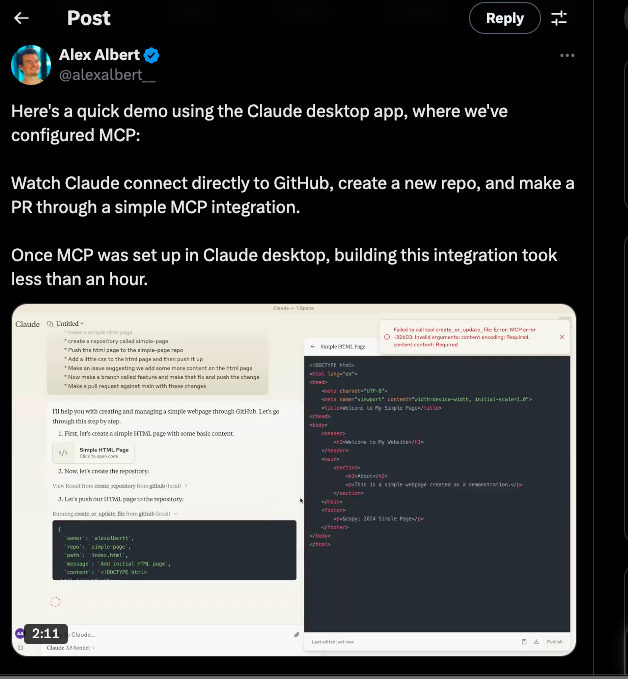Revolutionizing AI Integration: How Anthropic’s Model Context Protocol Simplifies Data Connectivity
Emerging technologies are continuously reshaping the landscape of artificial intelligence, and Anthropic’s latest innovation—the Model Context Protocol (MCP)—is a pivotal leap forward. Designed to streamline the integration of AI systems with diverse datasets, MCP offers a universal connection that eliminates the need for custom coding. This revolutionary protocol not only enhances AI performance but also paves the way for more accessible, efficient, and sustainable AI development.
Breaking Down the Model Context Protocol
At its core, the Model Context Protocol is an open-source tool that simplifies how AI systems interact with datasets. Traditionally, developers have been forced to create custom connectors for every unique dataset. MCP resolves this inefficiency by establishing a universal standard for connecting AI tools to multiple data sources. This approach drastically reduces the time and effort required to enable AI systems to draw context from diverse resources.
Key Features of Anthropic’s MCP
1. Universal Compatibility
Unlike traditional connectors tied to specific datasets, MCP works across all AI systems and data sources. This flexibility is a game-changer for developers who manage complex integrations.
2. Open-Source Accessibility
Anthropic’s decision to make MCP open-source encourages widespread adoption. Developers can freely modify and implement the protocol, fostering innovation within the AI community.
3. Enhanced Efficiency for AI Agents
MCP supports the development of more sophisticated AI agents capable of completing tasks seamlessly by drawing data from multiple sources without manual intervention.
How MCP Compares to OpenAI’s “Work with Apps” Feature
OpenAI’s recently tested “Work with Apps” feature allows ChatGPT to interact directly with coding apps. While this offers value within specific boundaries, Anthropic’s MCP aims for broader utility. Its open-source nature and universal applicability extend beyond app-level integration, making it a versatile solution for developers seeking a holistic approach to AI and data source connectivity.

How MCP Compares to OpenAI’s “Work with Apps” Feature
Real-World Applications of MCP
1. AI-Powered Code Generation
Leading platforms like Replit and Codeium are leveraging MCP to empower AI agents with the ability to auto-generate code, troubleshoot errors, and optimize workflows.
2. Enhanced Research Capabilities
By connecting to academic databases, MCP enables AI systems to provide more accurate and contextually relevant responses, streamlining research processes.
3. Business Process Optimization
From customer service chatbots to predictive analytics, MCP enhances how businesses utilize AI for data-driven decision-making.
The Rise of Agentic AI and MCP’s Role
The AI industry is increasingly leaning into agentic AI, where systems act autonomously to complete tasks. MCP’s ability to maintain context across datasets and tools positions it as a cornerstone for this evolution. By enabling AI systems to seamlessly access diverse information, MCP fuels the potential for autonomous agents to operate more efficiently.
Why MCP Matters for AI Development
1. Sustainable Architecture
As Anthropic emphasizes, MCP replaces fragmented integrations with a sustainable, standardized approach. This not only saves resources but also ensures scalability for future AI projects.
2. Streamlined Developer Workflow
Developers benefit immensely from MCP’s unified protocol, which reduces the need for constant updates and maintenance associated with multiple custom connectors.
3. Accelerating Innovation
With MCP, developers can focus on creating advanced AI functionalities instead of spending time on repetitive integration tasks.
Future Implications of the Model Context Protocol
1. Democratizing AI Development
MCP’s open-source framework democratizes access to advanced integration tools, allowing smaller organizations and independent developers to compete with industry giants.
2. Driving Interoperability Standards
As more systems adopt MCP, it could set a precedent for interoperability across the AI ecosystem, fostering collaboration and reducing silos.
3. Preparing for AI’s Next Frontier
With its capacity to maintain context across multiple tools, MCP is paving the way for more adaptive, intelligent AI systems that can operate in dynamic environments.
The Bigger Picture: Transforming AI Ecosystems
Anthropic’s Model Context Protocol exemplifies a shift toward inclusive, efficient AI ecosystems. By prioritizing universal standards and open-source collaboration, MCP not only addresses current challenges but also anticipates future needs in AI development. As industries increasingly rely on data-driven solutions, tools like MCP will play a critical role in ensuring AI systems remain adaptable and effective.
FAQs
What is Anthropic’s Model Context Protocol?
The Model Context Protocol (MCP) is an open-source tool designed to connect AI systems to multiple datasets through a universal protocol, eliminating the need for custom coding.
How does MCP differ from traditional AI integration methods?
MCP provides a universal standard for dataset connectivity, whereas traditional methods require custom connectors for each dataset, leading to inefficiencies.
Which industries can benefit from MCP?
MCP is versatile and can be applied across industries, including software development, academic research, business intelligence, and customer service.
What are the key advantages of MCP for developers?
MCP simplifies workflows, reduces integration time, and ensures scalability, allowing developers to focus on enhancing AI functionalities.
How does MCP support agentic AI?
By maintaining context across diverse datasets and tools, MCP empowers AI systems to perform autonomous tasks more effectively.
Is MCP accessible to small developers?
Yes, MCP’s open-source nature makes it accessible to developers and organizations of all sizes, promoting innovation across the board.
Anthropic’s Model Context Protocol is a landmark innovation that redefines how AI systems interact with datasets. By introducing a universal, open-source framework, MCP streamlines integration processes, boosts efficiency, and accelerates AI-driven advancements. As AI technology continues to evolve, the adoption of MCP could signal a new era of smarter, more sustainable development. Whether you’re a seasoned developer or a tech enthusiast, MCP represents an exciting step toward a more connected and intelligent AI future.

